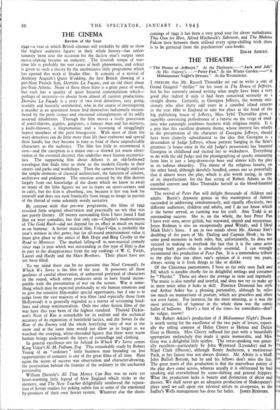THE THEATRE
"The House ot Jeffreys." At the Playhouse.—" Jack and Jill." At His Majesty's.—" Peter Pan." At the Winter Garden.—" A Midsummer Night's Dream." At the Westminster.
I PRESUME that Mr. Russell Thorndike set out to write a sort of Grand Guignol " thriller " for his sister in The House of lefireys, but he has narrowly missed writing what might have been a very good play indeed if only it had been conceived seriously as a straight drama. Certainly, as Georgina Jeffreys, the woman missionary who after thirty odd years in a cannibal island returns in the year 1880 to England to take her place as the head of the big publishing house of Jeffreys, Miss Sybil Thorndike gives a superbly convincing performance of a fanatic on the verge of madness who cunningly combines business with religious mania. It is a pity that this excellent dramatic theme, whose interest lies wholly in the presentation of the character of Georgina Jeffreys, should c have been clumsily subordinated to the idea that Georgina is a 1 descendant of Judge Jeffreys, whose portrait hanging in the firm's premises (a house once in the old Judge's possession) has haunted Georgina in childhood and incited her to wickedness. Everything to do with the old Judgr and the photographing of spooks emanating from him is just a long-drawn-cut bore and almost kills the play in its tedious absurdity. The theme of the religious fanatic, on the other hand, although sketchily handled, comes out so powerfully that it almost saves the play, which is also worth seeing, in spite of its imperfections for the fine acting of Robert Adams as the cannibal convert and Miss Thorndike herself as the blood-haunted missionary.
The revival of Peter Pan will delight thousands of zhildren and s adults. Barrie's dramatic genius in this masterpiece of fantasy el succeeded in addressing simultaneously, and equally effectively, two h different audiences, children and adults, and I do not know which u is the better served, so cunning was his craft. Ann Todd is an outstanding success. She is, on the whole, the best Peter Pan p I have ever seen, never girlish, but wayward, impish and mysterious. a Joyce Redman is also an exceptionally good Wendy, and I liked a Mark Daly's Smee. I am in two minds about Mr. Alastair Sim's b doubling of the parts of Mr. Darling and Captain Hook ; he has some good moments in both roles, but, unfortunately, he does not succeed in making us overlook the fact that it is the same actor playing both parts—this is absolutely essential. I can strongly recommend this production of Peter Pan. It is a tremendous tribute to the play that one alters one's opinion of it every ten years, always seeing in it fresh things to like or dislike.
Of the Christmas pantomimes, I have so far only seen 7ack and 741, which is notable chiefly for its delightful settings and costumes by " Physhe." These are above the average in taste and ingenuity. The music is also tuneful and tasteful, and does not try to make up in mere noise what it lacks in skill. Florence Desmond has style fc and Arthur Askey has a pleasing personality, although he relies fa too much on mannerisms of posture, which are graceless and often 1,4 not even funny. For instance, far the most amusing, as it was the di most artistic, bit of humour in the whole show was the comic 18 ballet of balloons. Here's a hint of the times for comedians—don't be vulgar, invent!
Mr. Robert Atkins's production of A Midsummer Night's Dream is worth seeing for the excellence of the two pairs of lovers, especially the telling contrast of Helen Cherry as Helena and Dulcie Gray as Hermia. Miss Cherry suffused her part with a beautifully appropriate melancholy that made it quite memorable, and Miss Gray was a delightful little spitfire. The verse-speaking was generally excellent—particularly by John Wynward (Lysander) and by Nigel Clark (Oberon), although Renee Ascherson, a meritorious Puck, at her fastest was not always distinct. Mr. Atkins is a bluff, John Bullish Bottom, but he and his fellows don't miss the fun, The great merit of this production is that the marvellous poetry of the play dos come across, whereas usually it is obliterated by bad speaking and overwhelmed by scene-shifting and general frippery. What the production lacks is beauty and distinction of decor and dresses. We shall never get an adequate production of Shakespeare's eli plays until we call upon our talented artists to co-operate, as the Sadler's Wells management has done for ballet. JAMES REDFERN.
ml th all
in by lam






















 Previous page
Previous page